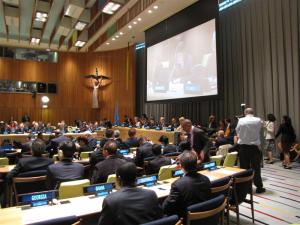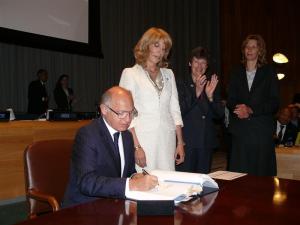 On hearing the Brexit result, my grandad texted me saying “Hopefully we’ll find a way to fix things and make this OK”. Like me he was shocked, disappointed and hurt that this was the choice made by such a significant proportion of Brits.
On hearing the Brexit result, my grandad texted me saying “Hopefully we’ll find a way to fix things and make this OK”. Like me he was shocked, disappointed and hurt that this was the choice made by such a significant proportion of Brits.
But this is really not OK.
It is not OK that our futures will be determined by the reckless actions of less than half of the population. It is not OK that the Leave campaign used lies and propaganda to get their way. It is not OK for Britain to wash its hands of the refugee crisis, to leave our neighbours to deal with this humanitarian challenge, a challenge whose root causes can be linked to Britain’s past actions.
The EU isn’t to blame for the UK’s more deep-rooted problems which caused a large section of society to vote to leave an economic, social and legal structure which took decades to build. As the news sinks in (slowly – like an infection in a dirty wound), many are already mourning what they are about to lose.
Since the referendum, the mood on the street is uncomfortable and tense, several of my friends have witnessed acts of racist language and threatening behaviour, the slim margin of victory having bolstered the confidence of a racist minority. The Brexit referendum result seems to have been misunderstood by some as an open season on minorities and foreigners. It is terrifying that some people see this as a green light for acting out their small-minded violent fantasies. The far right are gloating over their perceived triumph, they feel that, with this result, all their reprehensible views have a stamp of approval, that racism has suddenly become socially acceptable.
This tension is by no means unique to the UK. In Germany where large numbers of refugees have been taken in, a change is tangible: faces have changed, attitudes are changing and society is polarising, many working hard to adapt and understand, while some view new arrivals with suspicion and fear. In France, Spain, Italy and Netherlands tensions are rising, as well as in other European states, although the most xenophobic tend to be those who, as yet, have few foreigners. But the EU itself is not to blame for the rise of the far right. In fact the EU as a body is in a much better position to deal with these poisonous political opportunists, in promoting dialogue and responding to the root causes. Yes the EU needs reform, yes there needs to be a more balanced approach in policy decisions, but fragmentation and less integration is not the answer to fighting common problems and dealing with them effectively.
Just over half of the voters chose “Leave” yet this translates into roughly a quarter of the UK’s population. Many British overseas citizens (including my parents) have lived in mainland EU for over 15 years and therefore couldn’t cast a vote despite the profound effect this result will have on their lives. Residents of the UK from mainland Europe were also denied a say. Most of the younger voters wanted to stay in the EU. While the young and aspirational saw opportunities for education, work, business or just friendship and culture, this door has now been slammed and is about to be bolted. We, and our kids will still be suffering the consequences of this referendum when many of the Brexiters are long gone. But this is not to say everyone who voted out was over 60, there was a significant number of young and middle aged people too.
I grew up thinking of myself as a European, my British passport was just as good as my neighbour’s German one.
Now, although not worthless, my passport has suddenly lost a lot of advantages.
I worry about, the rise of the far right as they gloat in victory, I’m also concerned about the unravelling of key laws and agreements, such as the Human Rights Act and the Northern Ireland peace treaty and of course the effect of Scottish independence. The consequences we and our children will face are uncertain, while the regret I predict as a certainty. But the feeling now in my gut, as a European is one of a personal attack on my identity, on my rights and on my British passport. The nastiness of the “Leave” campaign shook me, it opened up vile sentiments and a culture of open racism. It brought me into a country I couldn’t recognise or identify with.
The fear tactics employed by the “Leave” campaign terrify me, a stirring of hatred and suspicion that is reminiscent of Nazi propaganda.
The atmosphere is one of “us vs. them”, tribalism at its worst. And which tribe do I even belong to?
It feels as if the UK has become a collection of small islands floating away from one another, unable to listen and unable to communicate.
London, where so many of our EU “foreigners” live and work, voted overwhelmingly to stay.
Living in London is an incredible experience for one main reason – that London is London – it is bizarre, unique, overcrowded, stressful and inspiring. It’s the most diverse and accepting place I have ever lived, anyone, and really anyone can be a Londoner. I don’t want this to change London, London is an incredible enclave in a confused polarised fearful and frustrated world. People here can quite happily live side by side in cramped buildings regardless of their culture or race. In London you can go to the shop wearing whatever you like be it your PJs or a one legged PVC trouser suit, without anyone even so much as blinking an eye. Every single person here contributes to its energy and it’s vibrance its magic and its intensity. What would London be without immigration, what would it be without the free movement of people across Europe?
I just hope that whatever happens next, will be thought out carefully and clearly to prevent any more damage from knee-jerk reactions based on nationalist nostalgic fantasies. The last time populism triumphed in Europe, things did not end well.




